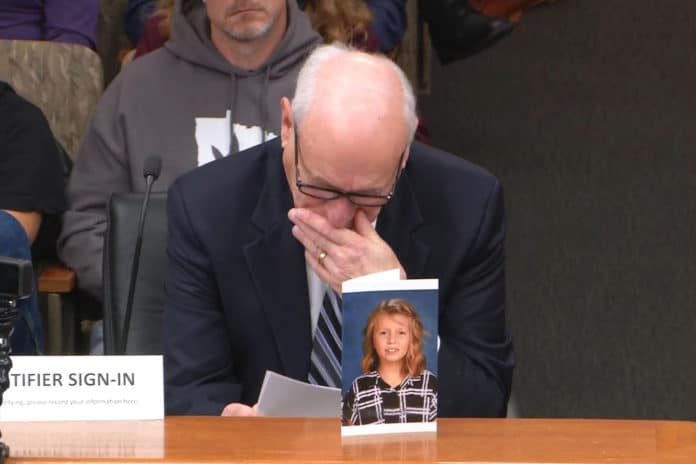
Dr. George Realmuto held up a photo of his 6-year-old granddaughter, Giada, last week in a legislative committee hearing on a bill that would legalize recreational cannabis in Minnesota for individuals age 21 and older.
HF100/SF73 contains several other provisions, which include expungement of past marijuana convictions and the ability for people to grow marijuana in their own homes. Now that the DFL controls the Legislature, its leadership is poised to pass the bill and get it to the desk of Gov. Tim Walz, who has expressed his support for legalization.
But that hasn’t deterred critics like Realmuto, a retired child and adolescent psychologist and a professor emeritus at the University of Minnesota, who has been outspoken about the role he believes habitual marijuana use by teens and young adults can play in impacting their still developing brains.
His testimony was both professional and personal, as the Twin Cities-based psychiatrist spoke of his own daughter Kathleen, Giada’s mother, who died three years ago after what Realmuto described as an addiction to cannabis that spiraled into abuse of stimulants.
“[Kathleen] was an acclaimed dancer, painter, sculptor, a staunch Gophers basketball and football fan,” Realmuto told legislators Jan. 11 in the House Commerce Policy and Finance Committee — the first of several committee stops the bill must make at the Capitol before it’s expected to receive a vote on the House and Senate floors. On Thursday, legislators in the House Judiciary Finance and Civil Law Committee will review the bill, which contains 12 chapters and more than 250 pages.
Realmuto — one of a number of testifiers last week who urged legislators to increase the age restriction of recreational sale and use of marijuana to age 25 and older — said his daughter started smoking cannabis in high school, never gave it up and eventually turned to stronger drugs to offset the effects of her marijuana addiction.
“There was very little support for treatment (for marijuana) at that point, and Kat made several decisions which made it clear she was not going to give it up,” Realmuto said.
Kathleen eventually began to abuse stimulants at that point, “which is what people who are addicted to cannabis do when they need to get stuff done,” Realmuto said.
Testifiers on the bill were limited to 90 seconds, and as Realmuto was asked to step away from the microphone he urged legislators to amend language ensuring recreational marijuana “is not available to anyone under age 25, because that is the neurodevelopmental step at which the brain is completely developed.”
“Parents will be coming back looking at you to understand why you allowed this to happen to their family,” Realmuto said.
Legislators also heard from a number of cannabis legalization activists, including Marcus Harcus, who referred to the bill as “prohibition light,” because while “it legalizes cannabis use, it still leaves a lot of opportunity to criminalize people.”
Other critics of the bill included Ryan Hamilton, a spokesperson for the Minnesota Catholic Conference, who echoed Dr. Realmuto’s call for the bill to increase age restriction to 25 and older, even as he acknowledged the impact the expungement provision would have on those who still carry criminal records for past marijuana-related offenses.
Hamilton, who also called for a THC potency cap in the bill, cited a 2020 study where the rates of cannabis use disorder in people ages 12 to 17 grew 25 percent more in states that legalized recreational marijuana than in those that didn’t. To date, 21 states have legalized recreational marijuana, with 11 having done so since 2020.
“For every one individual that receives an expungement, countless children, adolescents and vulnerable adults will suffer the collateral consequences of commercialized THC and the normalization of drug use.”
One of the bill’s most vocal opponents is the Minnesota Trucking Association, whose president, John Hausladen, told legislators that legalizing marijuana will make roadways less safe.
“Data from Colorado shows that traffic deaths where drivers tested positive for marijuana increased 138 percent since legalization,” Hausladen said.
Other testifiers, including representatives from the League of Minnesota Cities, asked legislators to ensure municipalities have at least as much ability to regulate sales of marijuana as it does on-sale and off-sale alcohol.
Gov. Tim Walz has told members of the media he believes the recreational marijuana bill will arrive at his desk “by May,” and has expressed his support for the bill. Its chief sponsor in the House, Rep. Zack Stephenson, DFL-Coon Rapids, told legislators at the hearing that the more than 250-page bill, which includes 12 chapters of proposed language, “is one of the most comprehensive, well-prepared pieces of legislation you will see.”
“I don’t think it’s an exaggeration to say that there is no other bill that has gone through as rigorous and as complete a process of development that this bill has,” Stephenson said,
Despite Stephenson’s confidence, Republican legislators in the House Commerce Committee expressed skepticism that the bill — which calls for more than $40 million in appropriations — has been appropriately vetted by all stakeholders.
“This is a massive appropriation, and we have no idea what the tax revenue is going to be,” said Rep. Ann Neu Brindley, R-North Branch.
“We do want to make sure if this is happening, we do it in a way that is protecting Minnesotans,” Neu Brindley said.
Hank Long
Hank Long is a journalism and communications professional whose writing career includes coverage of the Minnesota legislature, city and county governments and the commercial real estate industry. Hank received his undergraduate degree at the University of Minnesota, where he studied journalism, and his law degree at the University of St. Thomas. The Minnesota native lives in the Twin Cities with his wife and four children. His dream is to be around when the Vikings win the Super Bowl.













